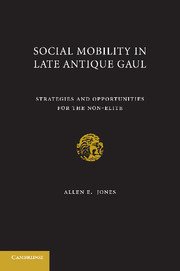Book contents
- Frontmatter
- Contents
- ACKNOWLEDGMENTS
- ABBREVIATIONS
- Gaul in the Late Sixth Century
- CHAPTER ONE INTRODUCTION: BARBARIAN GAUL
- CHAPTER TWO EVIDENCE AND CONTROL
- CHAPTER THREE SOCIAL STRUCTURE I: HIERARCHY, MOBILITY, AND ARISTOCRACIES
- CHAPTER FOUR SOCIAL STRUCTURE II: FREE AND SERVILE RANKS
- CHAPTER FIVE THE PASSIVE POOR: PRISONERS
- CHAPTER SIX THE ACTIVE POOR: PAUPERES AT CHURCH
- CHAPTER SEVEN HEALING AND AUTHORITY I: PHYSICIANS
- CHAPTER EIGHT HEALING AND AUTHORITY II: ENCHANTERS
- CHAPTER NINE CONCLUSION
- BIBLIOGRAPHY
- INDEX
CHAPTER NINE - CONCLUSION
Published online by Cambridge University Press: 18 December 2009
- Frontmatter
- Contents
- ACKNOWLEDGMENTS
- ABBREVIATIONS
- Gaul in the Late Sixth Century
- CHAPTER ONE INTRODUCTION: BARBARIAN GAUL
- CHAPTER TWO EVIDENCE AND CONTROL
- CHAPTER THREE SOCIAL STRUCTURE I: HIERARCHY, MOBILITY, AND ARISTOCRACIES
- CHAPTER FOUR SOCIAL STRUCTURE II: FREE AND SERVILE RANKS
- CHAPTER FIVE THE PASSIVE POOR: PRISONERS
- CHAPTER SIX THE ACTIVE POOR: PAUPERES AT CHURCH
- CHAPTER SEVEN HEALING AND AUTHORITY I: PHYSICIANS
- CHAPTER EIGHT HEALING AND AUTHORITY II: ENCHANTERS
- CHAPTER NINE CONCLUSION
- BIBLIOGRAPHY
- INDEX
Summary
Aristocratic authors, most of them clerics, controlled the written evidence for Gaul. Their sources projected visions for making and preserving a law and order, hierarchical Christian society. Meanwhile, makers of Salic law passed legislation that encouraged people of all ranks to look to the monarchy for privileges. Frankish kings sought to curtail establishment of a hereditary Gallic nobility, and toward this end, the Merovingians succeeded into the seventh century. Far from constituting a homogeneous group, Gallic aristocrats acted within multiple aristocracies distinguishable by region and behavior. Three important strategies by which aristocrats maintained and augmented local power were combining lands and resources through intermarrying with other elite families, acquiring high-level positions at court, and participating prominently at churches. Members of Gregory of Tours' family exemplify pursuit of each of these stratagems and reveal how the various aristocracies were not exclusive. The landed aristocrat Gregorius Attalus married the senatorial woman, Armentaria, by whom three children were born, and he acted as Count of Autun before becoming Bishop of Langres. Gallic nobles were not limited to social strategizing inside a single region or subkingdom. Thus Gregory himself was the product of an Auvergnian father and Burgundian mother, while it was an Austrasian king who selected him to preside as metropolitan over a westward lying province, Lugdunensis Tertia. Ecclesiastical aristocrats such as Gregory composed most of the surviving literature for the Barbarian era, and these productions betray their authors' hopes for a society in which people of all social ranks would heed Christian leaders.
- Type
- Chapter
- Information
- Social Mobility in Late Antique GaulStrategies and Opportunities for the Non-Elite, pp. 336 - 344Publisher: Cambridge University PressPrint publication year: 2009



